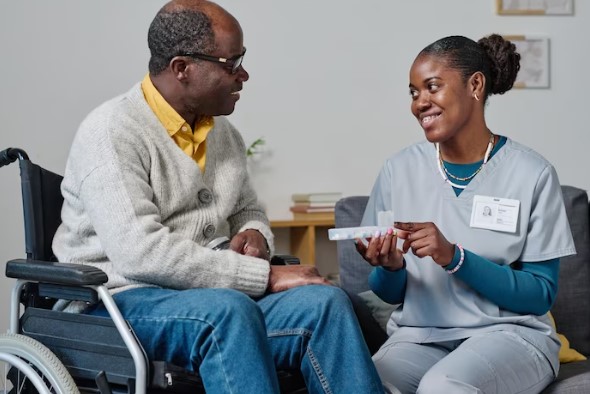
End of life care can be varied, holistic, and filled with love. We look at two end of life services – hospices and end of life doulas – that show how medical, emotional, and spiritual needs can be looked after in different settings.
What is end of life care and what is palliative care?
There’s a lot of confusion around palliative and end of life care. For starters, although related these two terms do not describe the same thing – they are distinct.
Receiving palliative care doesn’t neccesarily mean you’re dying – rather that this kind of care is for people with incurable diseases, many of whom could or will live for many more years or decades. It’s about making life as manageable and as good as it can be.
End of life care is a form of palliative care you are given when you’re approaching end of life – it offers support and is wide-ranging and holistic.
When does end of life care start?
From a healthcare perspective, end of life care may be recommended if you are likely to die within the next 12 months, although this can sometimes be hard for doctors to accurately predict. End of life care may last a few hours, days, weeks, months, or sometimes more than a year – the only rule is that it begins when you need it.
Who provides end of life care?
End of life care doesn’t just take place in a hospital or hospice with doctors and nurses. Depending on your needs and care plan, you could receive various forms of this care at home, over the phone, or at specialist day centers. A whole host of specialists and non-specialists can deliver end of life care.
Specialists not only include palliative care physicians and nurses, but also counsellors, social workers, bereavement therapists, speech therapists, religious or spiritual carers, and many others.
Non-specialists are made up of people in your community who have different roles to play in your care. These include district and practice nurses, GPs, and pharmacists.
This should give an idea of how varied and personalized end of life care services can be.
What services are available for end of life care?
Here we take a look at two important forms of care that showcase the range of services available.
Hospices – They are specialized healthcare spaces for palliative and end of life support. Yet, hospice care extends beyond hospice beds and medical treatment.
End of life doulas – Outside of your medical needs, doulas offer emotional and spiritual care, and they can do this inside or outside of the hospice setting.
Hospice care
In hospices, specialist palliative and end of life care is delivered by a multi-disciplinary team, made up of people who have different roles in a person’s care. This includes doctors, nurses, physiotherapists, occupational therapists, complementary therapists, counsellors and chaplains.
Hospices are happy places full of love and laughter where families can create special memories and spend quality time with their loved ones. This isn’t just about medicine – it’s about whatever is important to the patient and their family and friends. We take a holistic approach and see the person – not their illness.
End of life doula
An end of life doula, sometimes called a death doula or death midwife, is a non-medical specialist trained to provide emotional and spiritual support to terminally ill people. According to the International End of Life Doula Association, a doula “holds the space for the kind of dying experience that honors who the person is and has been in their life.”
Doulas are there to allow the dying person to be who they are, and to allow them to be more than old or sick. A doula listens deeply to the concerns, fears, hopes, and life stories of the dying person and their loved ones to bring them peace at the end of life.”
There are many things a doula can do, including:
- Being a companion and source of comfort.
- Offering emotional support to the care recipient and their loved ones.
- Have conversations that help death seem less scary and lonely.
- Providing practical support – for example, walking the dog, providing care, preparing meals, and running errands.
- Being a point of contact for the other care teams.
- Enabling family carers to take a break.
- Advocating for the care recipient’s wishes – for example, making sure the desired religious or cultural rituals are followed during end of life or after death.

Recent Comments